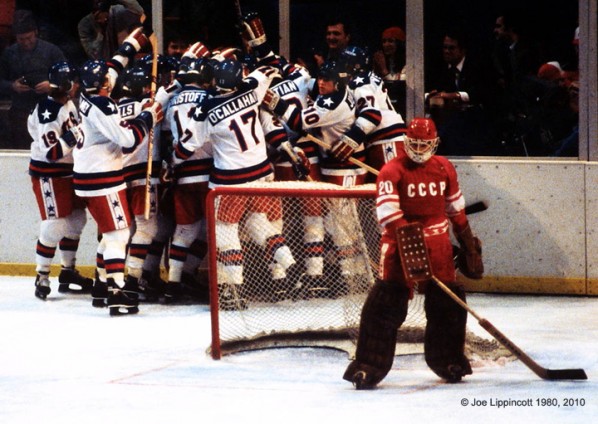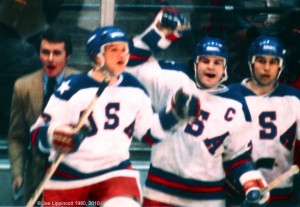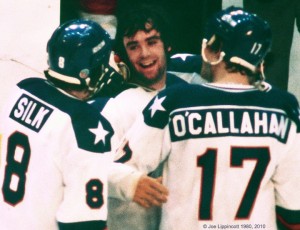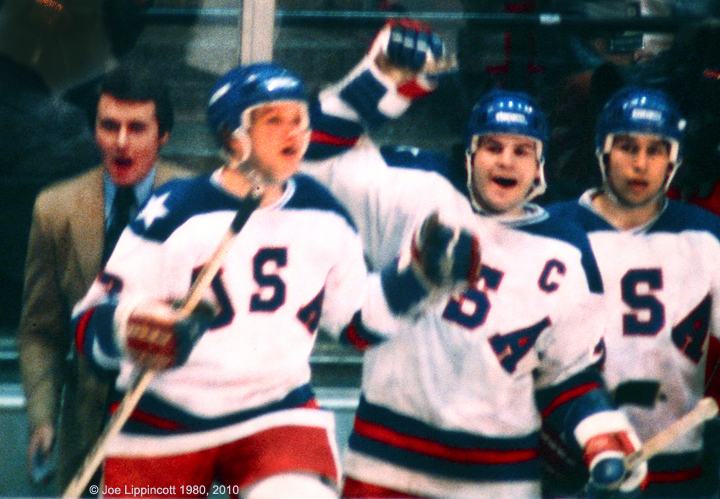As a student in Basic Photo 305 at Boston University, I’m privileged to learn photography from a real expert in the field, Joe Lippincott. In class this past Monday, Professor Lippincott shared with us his still-vivid memories of photographing the “Miracle On Ice” at the winter Olympics 30 years ago. I was touched by his story and thought it would resonate as well with other students at BU–especially because four of the USA Olympic hockey players at that time were from BU. The following is the professor’s anecdote he shared with us in class, as well as three photos he took at the historic game seen across the world. Enjoy.

The year 1979 had been a rough one for the United States. Inflation was high, and unemployment was inching up and up. The second oil crisis had hit, sometimes causing long lines at the gas pumps. To make matters even worse, 53 Americans had been taken hostage in Iran that Nov. 4. They were not released until 14 months later, just minutes before Ronald Reagan was sworn in as President on January 20, 1981.
The “Miracle on Ice” on February 22, 1980 would serve to ignite a much-needed explosion of U.S. pride and patriotism. Twenty young American amateur hockey players would upset the nearly invincible Russian professional hockey machine late that afternoon at the Lake Placid Olympic Arena. The infamous game has been called the greatest sporting event ever played by some, and the greatest sporting event of the 20th century by others.
The 1980 USA hockey team was comprised mostly of Minnesota players, since Olympic Head Coach Herb Brooks was also head coach at the University of Minnesota.
Four Massachusetts players were also selected to the 20-man team, all from Boston University: Olympic team captain Mike Eruzione from Winthrop, Jim Craig from North Easton, Dave Silk from Scituate, and Jack O’Callahan from Charlestown.
Eruzione, who was also captain of the BU team his senior year and the second highest all-time BU scorer, now is director of development for BU athletics. According to their online biographies, Craig is a local marketing consultant, Silk works with Putnam Investments in Boston, and O’Callahan works with the Chicago Mercantile Market. All played professional hockey after the Olympics, but none had the kind of success each of them experienced on that one momentous day when they achieved the nearly impossible.

Two weeks before the historic game, the Soviet Union’s Red Army team, gold medal winners in five of the previous six Olympics, predictably overwhelmed the USA team, 10-3, during an exhibition game at Madison Square Garden.
Entering the XIII Winter Olympics competition at Lake Placid, the USA team wasn’t even considered a serious contender for a medal. But, before it was over some 12 days later, these young amateur hockey players took this country–and the world–on a thrilling ride to historic and everlasting glory.
Team USA’s first game with Sweden ended in a 2-2 deadlock. In their second contest, the USA crushed Czechoslovakia, 7-3. The Czechs had been second favorite, behind the Soviets, to win gold. USA went on to win three more games: 5-1 over Norway, 7-2 over Romania, and 4-2 over Germany. USA and the Swedes both advanced to the all-important medal round.
Meanwhile, the undefeated Soviets had trounced Japan, 16-0; the Netherlands, 17-4; Poland, 8-1; Finland, 4-2, and Canada, 6-4, on their journey to the medal round. The Olympic meeting of these Cold War foes, and the anticipated trouncing of the upstart USA team, was practically assured.
ABC, the television network airing the 1980 Olympics, was so certain the Americans didn’t have a breath of a chance against the Red Army professionals that they didn’t even broadcast the 5 p.m. game live. Most of this country had to watch the battle on tape delay during prime time later that evening.
The Russians took a 1-0 lead early in the game, before the U.S. scored their first goal, followed by another from the Soviets, then answered by the U.S. with one second left in the first period to tie the score at 2. In the second period, the Soviets went ahead, 3-2, before the Americans tied it again at 3 each.
The third and final period set the stage for BU’s Mike Eruzione’s game-winning goal with ten minutes remaining, probably the longest, most tension-filled, ten minutes in sports history. After spectators wildly cheered Eruzione’s goal, the arena went eerily silent. You could hear a puck drop.
As the final minutes and seconds ticked off, as the Soviets desperately tried to at least tie the game, the crowd spontaneously began chanting, “USA! USA!” It was a deafening, inexplicably intoxicating couple of moments. When the crowd burst out with “God Bless America”, tears began streaming down my face. I just couldn’t help it. This rag-tag assemblage of college kids from BU and Minnesota had made sports and Olympic history. It was to have far greater ramifications than just their spectacular win on the Olympic ice that night. The morale of this entire country took a giant leap upward.

People who heard about the upset victory on radio or television news bulletins jumped out of their cars on the interstates and hugged each other. There were spontaneous celebrations everywhere when the news got out that Team USA had beaten the Soviet Army team, 4-3. It was a time to rejoice, to suspend for a short while the burdens of the day–the oil crisis, the inflation, the unemployment, perhaps even some of the fears for the hostages in Iran, to celebrate a truly monumental political and sporting event. The good guys had humbled the mighty Soviets!
But they hadn’t won the gold–yet. Two days later, on Sunday, February 24, the Americans clinched gold with a 4-2 victory over Finland. That was the infamous morning when BU goalie Jim Craig, draped in an American flag, skated around the arena ice looking for his family.
As a photojournalist who has had the privilege to cover many important and historic events, the Miracle on Ice is unquestionably my most exciting, significant, and memorable experience.
Joe Lippincott has been a Lecturer in the College of Communication since 1990. He teaches two classes, Photojournalism I and a section of Basic Photography. At Lake Placid in 1980, he photographed under contract to Time-Life/Sports Illustrated and Gamma-Liaison photo agency, Paris.
©Joe Lippincott 2010


I had Professor Lippincott. This story will ALWAYS give me goosebumps and I wasn’t even born yet. Thanks for getting this, Jen :]
Hello great post. I would just like to add something though. Your first picture is showing Vladislav Tretiak. He is the starting goalie, not the backup goalie, Vladimir Myshkin. This was taken just before the first period was over, and when the U.S. team had just scored their 2nd point tieing the game.
i would have to correct the accuracy of your caption; first, the Soviet goalie’s last name is spelled Tretiak and this picture was taken at the end of the first period when the score was 2-2. he was pulled at the start of the second period and didn’t return to the ice.